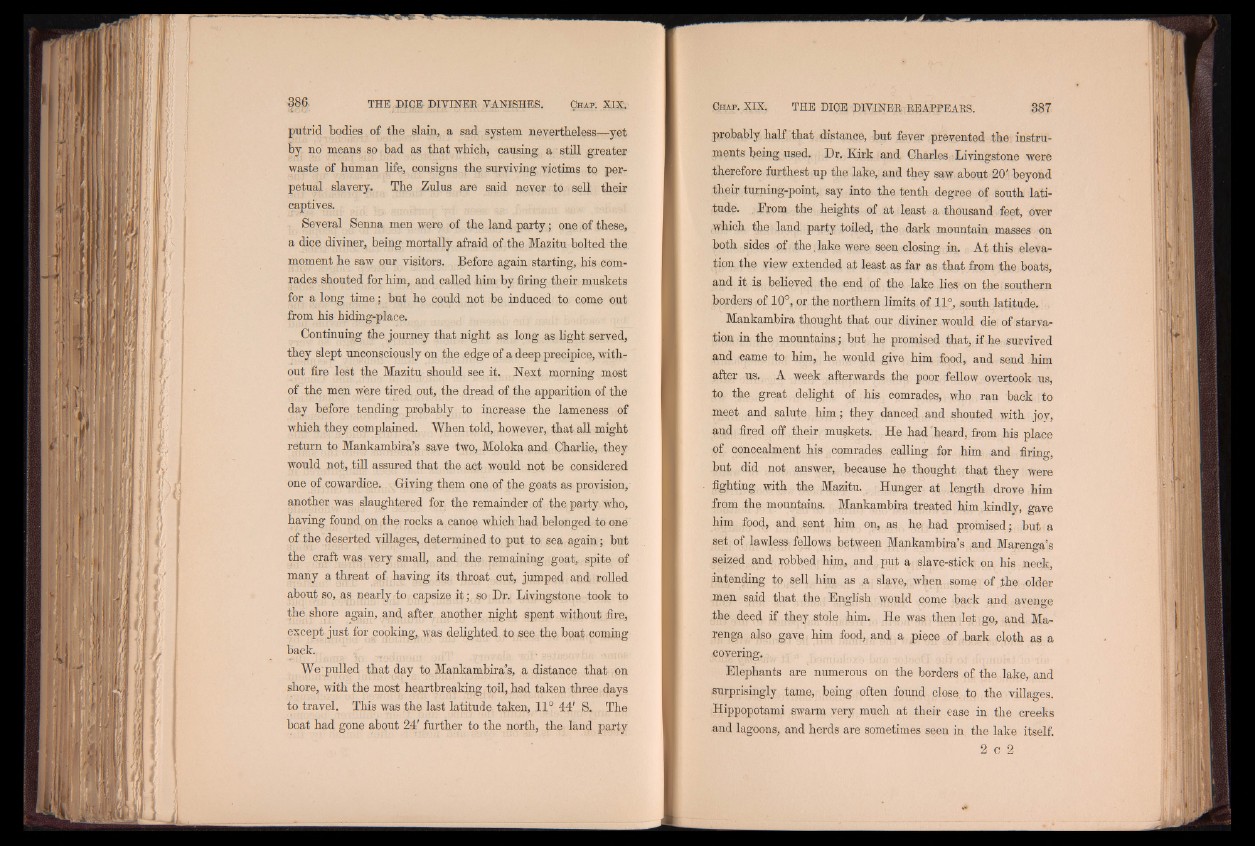
putrid bodies of the slain, a sad system nevertheless—yet
by no means so bad as that which, causing a still greater
waste of human life, consigns the surviving victims to perpetual
slavery. The Zulus are said never to sell their
captives.
Several Senna men were of the land party; one of these,
a dice diviner, being mortally afraid of the Mazitu bolted the
moment he saw our visitors. Before again starting, his comrades
shouted for him, and called him by firing their muskets
for a long time; but he could not be induced to come out
from his hiding-place.
Continuing the journey that night as long as light served,
they slept unconsciously on the edge of a deep precipice, without
fire lest the Mazitu should see it. Next morning most
of the men were tired out, the dread of the apparition of the
day before tending probably to increase the lameness of
which they complained. When told, however, that all might
return to Mankambira’s save two, Moloka and Charlie, they
would not, till assured that the act would not be considered
one of cowardice. Giving them one of the goats as provision,’
another was slaughtered for the remainder of the party who,
having found on the rocks a canoe which had belonged to one
of the deserted villages, determined to put to sea again; but
the craft was very small, and the remaining goat, spite of
many a threat of having its throat cut, jumped and rolled
about so, as nearly to capsize it; so Dr. Livingstone took to
the shore again, and after, another night spent without fire,
except just for .cooking, was delighted to see the boat coming
back.
We pulled that day to Mankambira’s, a distance that on
shore, with the most heartbreaking toil, had taken three days
to travel. This was the last latitude taken, 11° 44' S. The
boat had gone about 24' further to the north, the land party
probably half that distance, but fever prevented the instruments
being used. Dr. Kirk and Charles Livingstone were
therefore furthest up the lake, and they saw about 20'’ beyond
their turning-point, say into the tenth degree of south latitude.
. Erom the heights of at least a thousand feet, over
.which the land party toiled, the dark mountain masses on
both sides of the. lake were seen closing in. At this elevation
the view extended at least as far as that from the boats,
and it is believed the end of the lake lies on the southern
borders of 10°, or the northern limits of 11°, south latitude.
Mankambira thought that our diviner would die of starvation
in the mountains ; but he promised that, if he survived
and came to him, he would give him food, and send him
after us. A week afterwards the poor fellow overtook us,
to the great delight of his comrades, who ran back to
meet and salute him; they danced and shouted with joy,
and fired off their muskets. He had 'heard, from his place
of concealment his comrades calling for him and firum,
but did not answer, because he thought that they were
fighting with the Mazitu. Hunger at length drove him
from the mountains. Mankambira treated him kindly, gave
him food, and sent him on, as he had promised; but a
set of lawless- fellows between Mankambira’s ,and Marenga’s
seized and robbed him, and put a slave-stick on his neck,
intending to sell him as .a slave, when some of the older
men said that the English would come back and avenge
the deed if they stoic him. He was then let go, and Ma-
renga also gave him food, and a piece of bark cloth as a
covering;. \ • O ’- i
Elephants are numerous on the borders of the lake, and
surprisingly tame, being often found close, to the villages.
Hippopotami swarm very much at their ease in the creeks
and lagoons, and herds are sometimes seen in the lake itself.
2 c 2